Psychological Development: Analysis of Erikson's Life Stages Theory
VerifiedAdded on 2020/12/29
|11
|2727
|86
Essay
AI Summary
This essay provides an analysis of Erik Erikson's theory of psychological development, focusing on the different stages of life and the associated psychological crises. The assignment begins by selecting the trust vs. mistrust stage and describing the key events and experiences that occur during this period. It then explores how individuals negotiate this life stage, addressing the psychological crisis and related tasks. The essay also examines factors that support or hinder development, including parental roles, siblings, and environmental influences. Furthermore, it considers the impact of various elements such as strengths, disabilities, sociocultural factors, life-threatening experiences, and personal loss. Finally, the essay discusses the principles and standards from the code of ethics and the impact of the chosen life stage on social work practice.
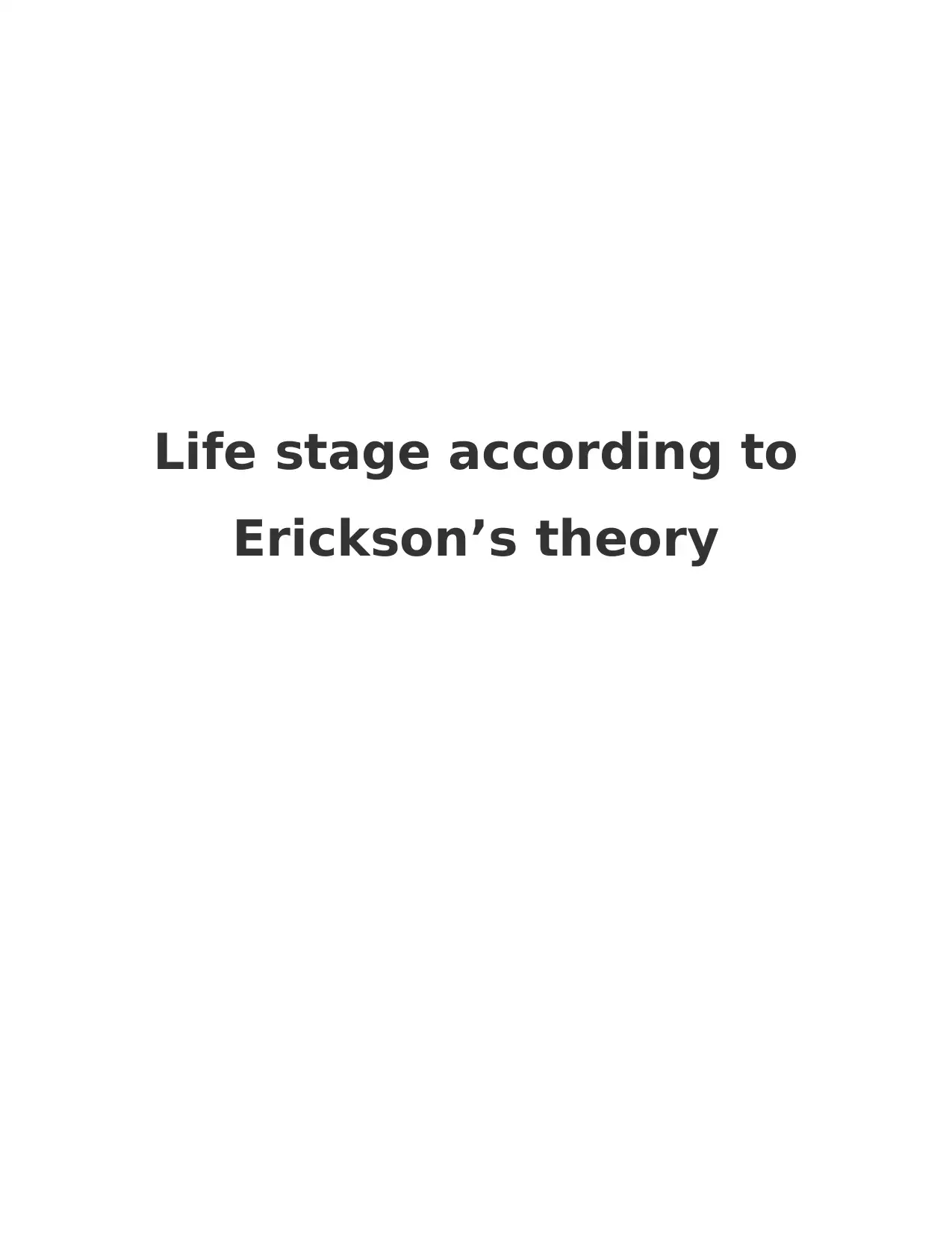
Life stage according to
Erickson’s theory
Erickson’s theory
Paraphrase This Document
Need a fresh take? Get an instant paraphrase of this document with our AI Paraphraser
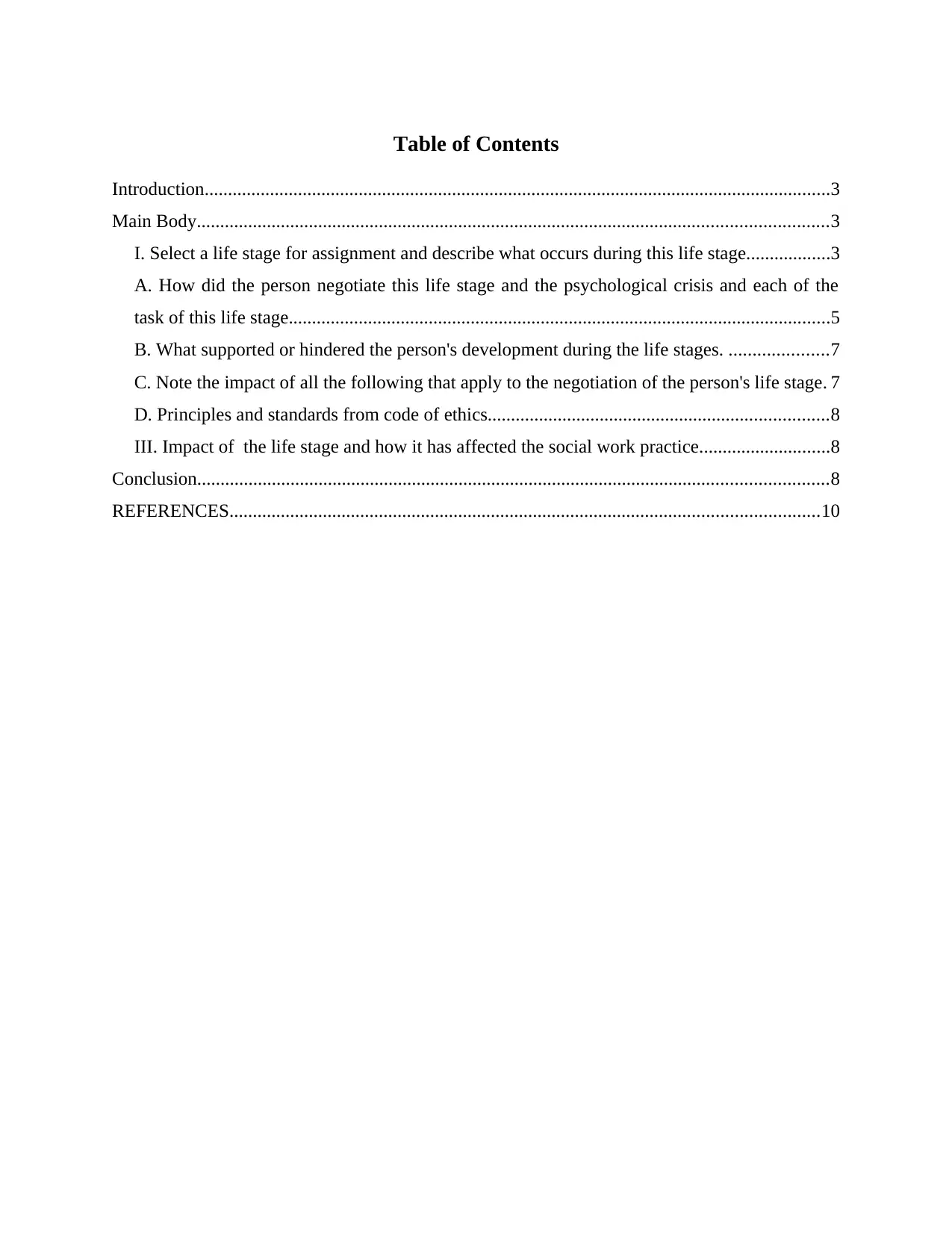
Table of Contents
Introduction......................................................................................................................................3
Main Body.......................................................................................................................................3
I. Select a life stage for assignment and describe what occurs during this life stage..................3
A. How did the person negotiate this life stage and the psychological crisis and each of the
task of this life stage....................................................................................................................5
B. What supported or hindered the person's development during the life stages. .....................7
C. Note the impact of all the following that apply to the negotiation of the person's life stage. 7
D. Principles and standards from code of ethics.........................................................................8
III. Impact of the life stage and how it has affected the social work practice............................8
Conclusion.......................................................................................................................................8
REFERENCES..............................................................................................................................10
Introduction......................................................................................................................................3
Main Body.......................................................................................................................................3
I. Select a life stage for assignment and describe what occurs during this life stage..................3
A. How did the person negotiate this life stage and the psychological crisis and each of the
task of this life stage....................................................................................................................5
B. What supported or hindered the person's development during the life stages. .....................7
C. Note the impact of all the following that apply to the negotiation of the person's life stage. 7
D. Principles and standards from code of ethics.........................................................................8
III. Impact of the life stage and how it has affected the social work practice............................8
Conclusion.......................................................................................................................................8
REFERENCES..............................................................................................................................10
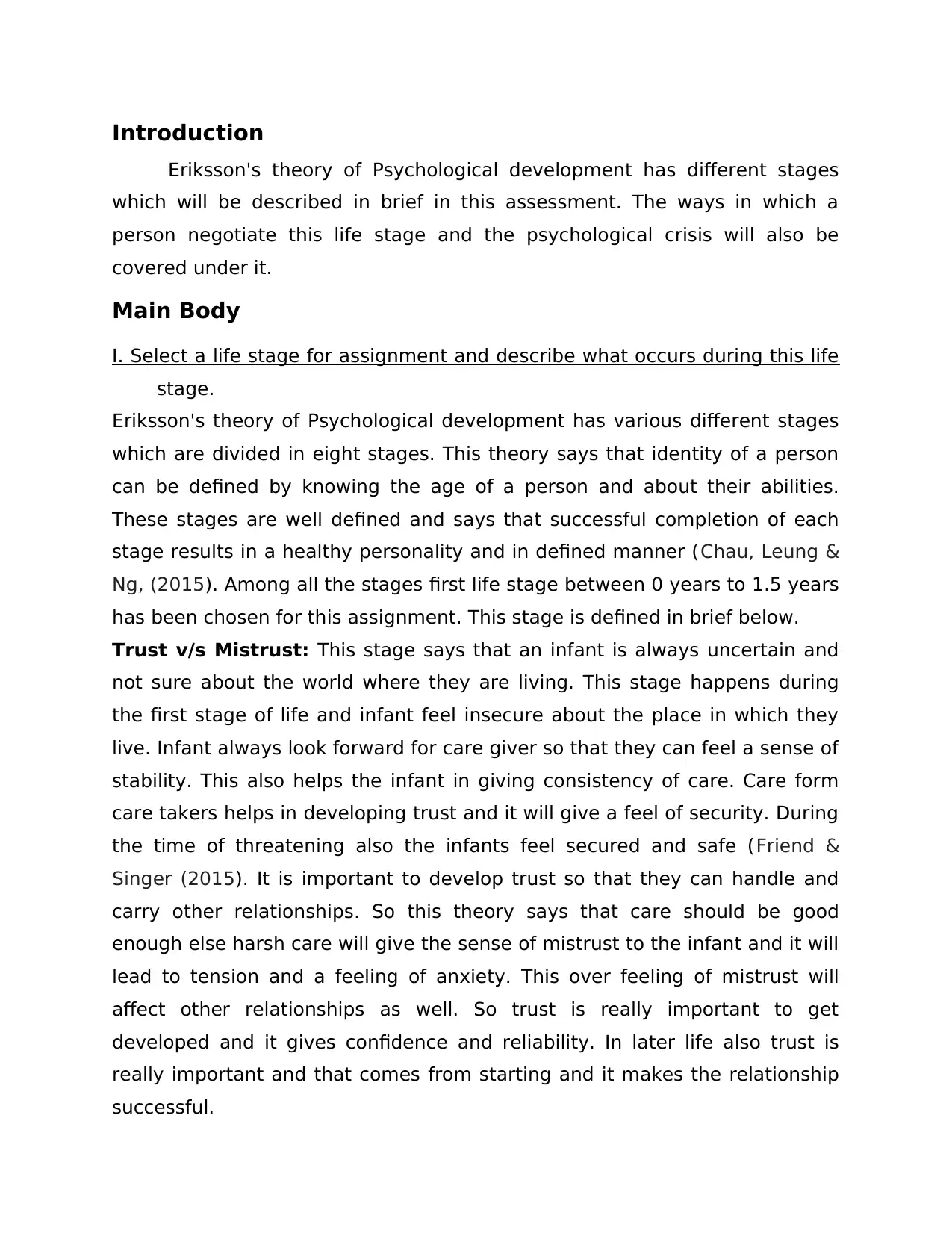
Introduction
Eriksson's theory of Psychological development has different stages
which will be described in brief in this assessment. The ways in which a
person negotiate this life stage and the psychological crisis will also be
covered under it.
Main Body
I. Select a life stage for assignment and describe what occurs during this life
stage.
Eriksson's theory of Psychological development has various different stages
which are divided in eight stages. This theory says that identity of a person
can be defined by knowing the age of a person and about their abilities.
These stages are well defined and says that successful completion of each
stage results in a healthy personality and in defined manner (Chau, Leung &
Ng, (2015). Among all the stages first life stage between 0 years to 1.5 years
has been chosen for this assignment. This stage is defined in brief below.
Trust v/s Mistrust: This stage says that an infant is always uncertain and
not sure about the world where they are living. This stage happens during
the first stage of life and infant feel insecure about the place in which they
live. Infant always look forward for care giver so that they can feel a sense of
stability. This also helps the infant in giving consistency of care. Care form
care takers helps in developing trust and it will give a feel of security. During
the time of threatening also the infants feel secured and safe (Friend &
Singer (2015). It is important to develop trust so that they can handle and
carry other relationships. So this theory says that care should be good
enough else harsh care will give the sense of mistrust to the infant and it will
lead to tension and a feeling of anxiety. This over feeling of mistrust will
affect other relationships as well. So trust is really important to get
developed and it gives confidence and reliability. In later life also trust is
really important and that comes from starting and it makes the relationship
successful.
Eriksson's theory of Psychological development has different stages
which will be described in brief in this assessment. The ways in which a
person negotiate this life stage and the psychological crisis will also be
covered under it.
Main Body
I. Select a life stage for assignment and describe what occurs during this life
stage.
Eriksson's theory of Psychological development has various different stages
which are divided in eight stages. This theory says that identity of a person
can be defined by knowing the age of a person and about their abilities.
These stages are well defined and says that successful completion of each
stage results in a healthy personality and in defined manner (Chau, Leung &
Ng, (2015). Among all the stages first life stage between 0 years to 1.5 years
has been chosen for this assignment. This stage is defined in brief below.
Trust v/s Mistrust: This stage says that an infant is always uncertain and
not sure about the world where they are living. This stage happens during
the first stage of life and infant feel insecure about the place in which they
live. Infant always look forward for care giver so that they can feel a sense of
stability. This also helps the infant in giving consistency of care. Care form
care takers helps in developing trust and it will give a feel of security. During
the time of threatening also the infants feel secured and safe (Friend &
Singer (2015). It is important to develop trust so that they can handle and
carry other relationships. So this theory says that care should be good
enough else harsh care will give the sense of mistrust to the infant and it will
lead to tension and a feeling of anxiety. This over feeling of mistrust will
affect other relationships as well. So trust is really important to get
developed and it gives confidence and reliability. In later life also trust is
really important and that comes from starting and it makes the relationship
successful.
⊘ This is a preview!⊘
Do you want full access?
Subscribe today to unlock all pages.

Trusted by 1+ million students worldwide
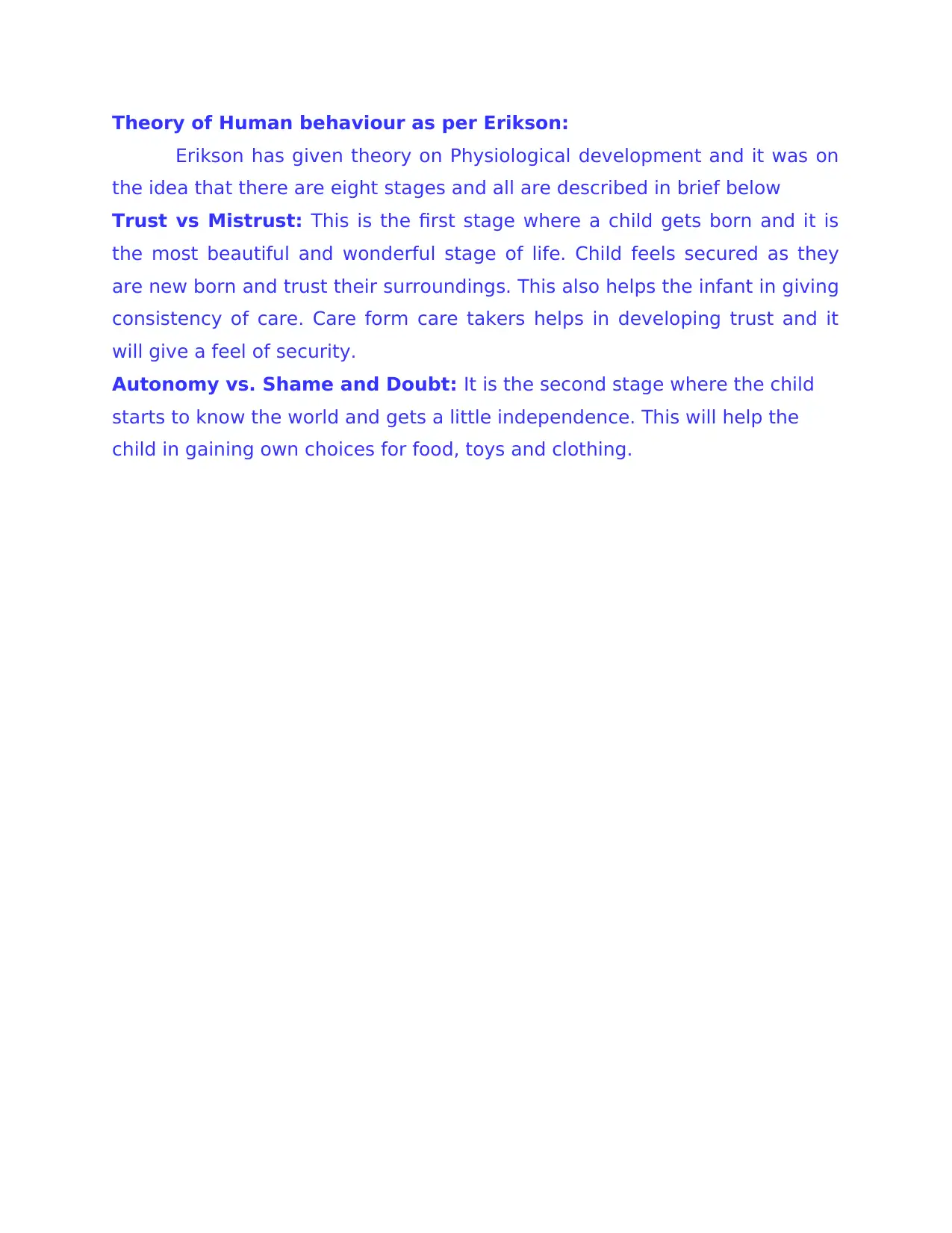
Theory of Human behaviour as per Erikson:
Erikson has given theory on Physiological development and it was on
the idea that there are eight stages and all are described in brief below
Trust vs Mistrust: This is the first stage where a child gets born and it is
the most beautiful and wonderful stage of life. Child feels secured as they
are new born and trust their surroundings. This also helps the infant in giving
consistency of care. Care form care takers helps in developing trust and it
will give a feel of security.
Autonomy vs. Shame and Doubt: It is the second stage where the child
starts to know the world and gets a little independence. This will help the
child in gaining own choices for food, toys and clothing.
Erikson has given theory on Physiological development and it was on
the idea that there are eight stages and all are described in brief below
Trust vs Mistrust: This is the first stage where a child gets born and it is
the most beautiful and wonderful stage of life. Child feels secured as they
are new born and trust their surroundings. This also helps the infant in giving
consistency of care. Care form care takers helps in developing trust and it
will give a feel of security.
Autonomy vs. Shame and Doubt: It is the second stage where the child
starts to know the world and gets a little independence. This will help the
child in gaining own choices for food, toys and clothing.
Paraphrase This Document
Need a fresh take? Get an instant paraphrase of this document with our AI Paraphraser
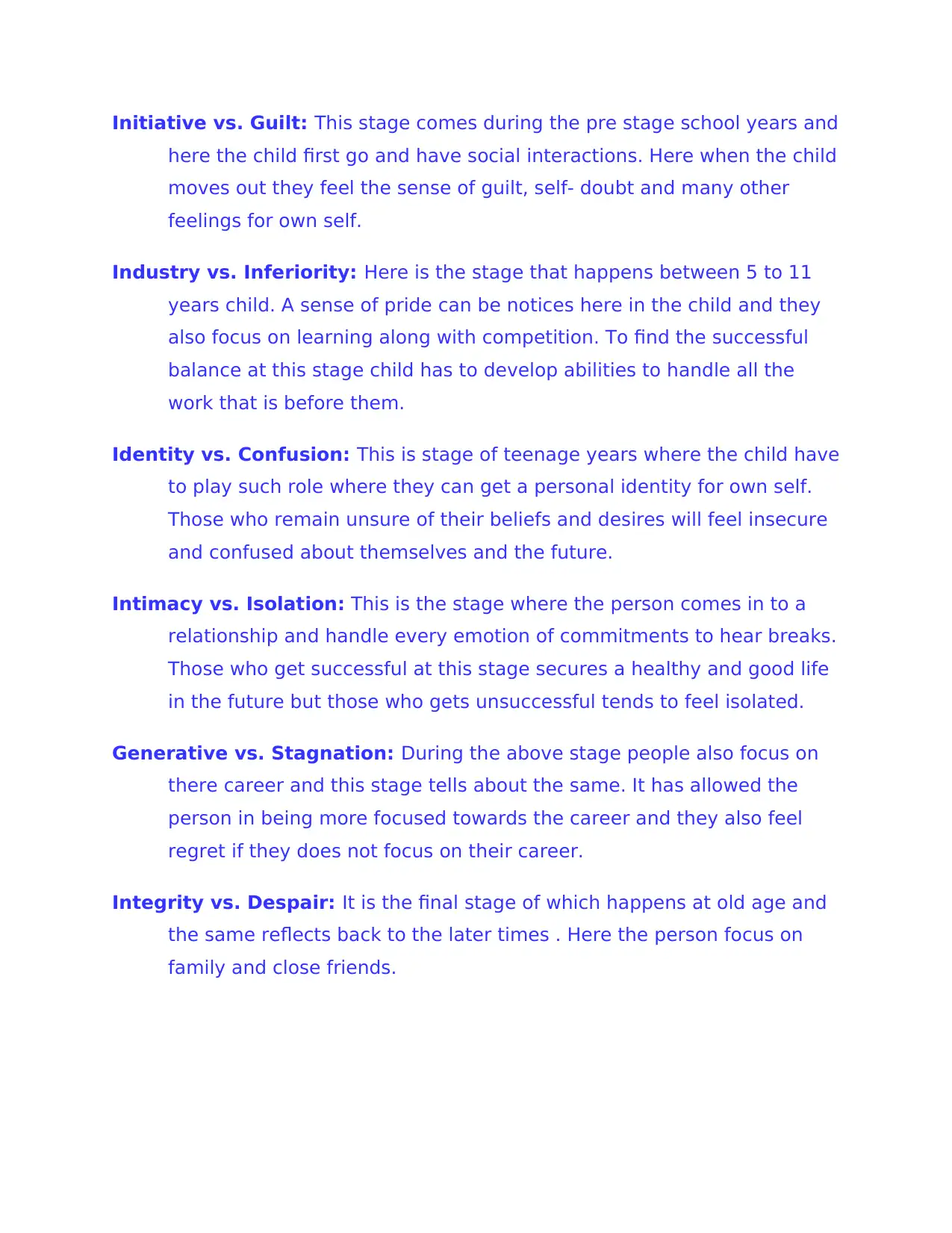
Initiative vs. Guilt: This stage comes during the pre stage school years and
here the child first go and have social interactions. Here when the child
moves out they feel the sense of guilt, self- doubt and many other
feelings for own self.
Industry vs. Inferiority: Here is the stage that happens between 5 to 11
years child. A sense of pride can be notices here in the child and they
also focus on learning along with competition. To find the successful
balance at this stage child has to develop abilities to handle all the
work that is before them.
Identity vs. Confusion: This is stage of teenage years where the child have
to play such role where they can get a personal identity for own self.
Those who remain unsure of their beliefs and desires will feel insecure
and confused about themselves and the future.
Intimacy vs. Isolation: This is the stage where the person comes in to a
relationship and handle every emotion of commitments to hear breaks.
Those who get successful at this stage secures a healthy and good life
in the future but those who gets unsuccessful tends to feel isolated.
Generative vs. Stagnation: During the above stage people also focus on
there career and this stage tells about the same. It has allowed the
person in being more focused towards the career and they also feel
regret if they does not focus on their career.
Integrity vs. Despair: It is the final stage of which happens at old age and
the same reflects back to the later times . Here the person focus on
family and close friends.
here the child first go and have social interactions. Here when the child
moves out they feel the sense of guilt, self- doubt and many other
feelings for own self.
Industry vs. Inferiority: Here is the stage that happens between 5 to 11
years child. A sense of pride can be notices here in the child and they
also focus on learning along with competition. To find the successful
balance at this stage child has to develop abilities to handle all the
work that is before them.
Identity vs. Confusion: This is stage of teenage years where the child have
to play such role where they can get a personal identity for own self.
Those who remain unsure of their beliefs and desires will feel insecure
and confused about themselves and the future.
Intimacy vs. Isolation: This is the stage where the person comes in to a
relationship and handle every emotion of commitments to hear breaks.
Those who get successful at this stage secures a healthy and good life
in the future but those who gets unsuccessful tends to feel isolated.
Generative vs. Stagnation: During the above stage people also focus on
there career and this stage tells about the same. It has allowed the
person in being more focused towards the career and they also feel
regret if they does not focus on their career.
Integrity vs. Despair: It is the final stage of which happens at old age and
the same reflects back to the later times . Here the person focus on
family and close friends.
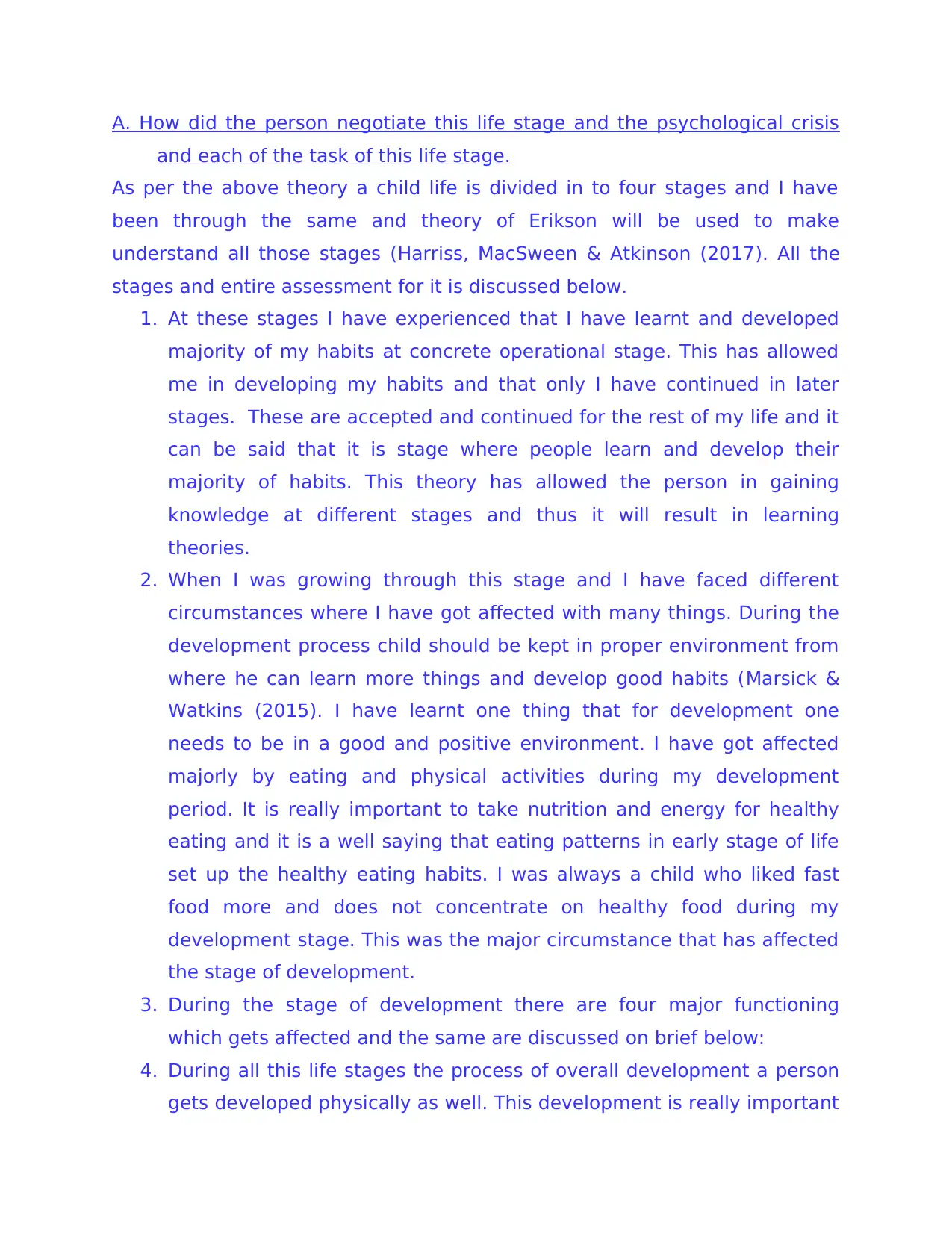
A. How did the person negotiate this life stage and the psychological crisis
and each of the task of this life stage.
As per the above theory a child life is divided in to four stages and I have
been through the same and theory of Erikson will be used to make
understand all those stages (Harriss, MacSween & Atkinson (2017). All the
stages and entire assessment for it is discussed below.
1. At these stages I have experienced that I have learnt and developed
majority of my habits at concrete operational stage. This has allowed
me in developing my habits and that only I have continued in later
stages. These are accepted and continued for the rest of my life and it
can be said that it is stage where people learn and develop their
majority of habits. This theory has allowed the person in gaining
knowledge at different stages and thus it will result in learning
theories.
2. When I was growing through this stage and I have faced different
circumstances where I have got affected with many things. During the
development process child should be kept in proper environment from
where he can learn more things and develop good habits (Marsick &
Watkins (2015). I have learnt one thing that for development one
needs to be in a good and positive environment. I have got affected
majorly by eating and physical activities during my development
period. It is really important to take nutrition and energy for healthy
eating and it is a well saying that eating patterns in early stage of life
set up the healthy eating habits. I was always a child who liked fast
food more and does not concentrate on healthy food during my
development stage. This was the major circumstance that has affected
the stage of development.
3. During the stage of development there are four major functioning
which gets affected and the same are discussed on brief below:
4. During all this life stages the process of overall development a person
gets developed physically as well. This development is really important
and each of the task of this life stage.
As per the above theory a child life is divided in to four stages and I have
been through the same and theory of Erikson will be used to make
understand all those stages (Harriss, MacSween & Atkinson (2017). All the
stages and entire assessment for it is discussed below.
1. At these stages I have experienced that I have learnt and developed
majority of my habits at concrete operational stage. This has allowed
me in developing my habits and that only I have continued in later
stages. These are accepted and continued for the rest of my life and it
can be said that it is stage where people learn and develop their
majority of habits. This theory has allowed the person in gaining
knowledge at different stages and thus it will result in learning
theories.
2. When I was growing through this stage and I have faced different
circumstances where I have got affected with many things. During the
development process child should be kept in proper environment from
where he can learn more things and develop good habits (Marsick &
Watkins (2015). I have learnt one thing that for development one
needs to be in a good and positive environment. I have got affected
majorly by eating and physical activities during my development
period. It is really important to take nutrition and energy for healthy
eating and it is a well saying that eating patterns in early stage of life
set up the healthy eating habits. I was always a child who liked fast
food more and does not concentrate on healthy food during my
development stage. This was the major circumstance that has affected
the stage of development.
3. During the stage of development there are four major functioning
which gets affected and the same are discussed on brief below:
4. During all this life stages the process of overall development a person
gets developed physically as well. This development is really important
⊘ This is a preview!⊘
Do you want full access?
Subscribe today to unlock all pages.

Trusted by 1+ million students worldwide
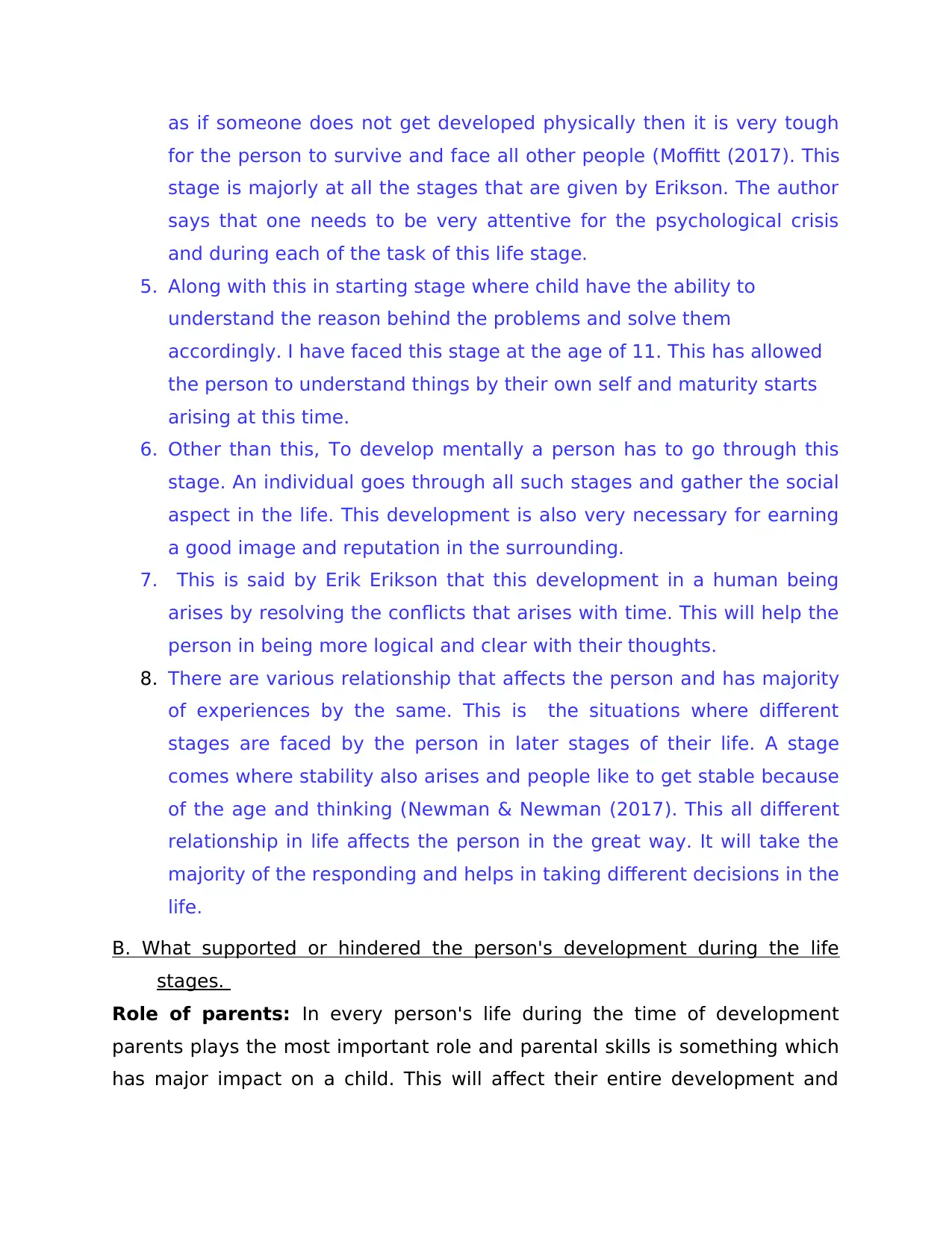
as if someone does not get developed physically then it is very tough
for the person to survive and face all other people (Moffitt (2017). This
stage is majorly at all the stages that are given by Erikson. The author
says that one needs to be very attentive for the psychological crisis
and during each of the task of this life stage.
5. Along with this in starting stage where child have the ability to
understand the reason behind the problems and solve them
accordingly. I have faced this stage at the age of 11. This has allowed
the person to understand things by their own self and maturity starts
arising at this time.
6. Other than this, To develop mentally a person has to go through this
stage. An individual goes through all such stages and gather the social
aspect in the life. This development is also very necessary for earning
a good image and reputation in the surrounding.
7. This is said by Erik Erikson that this development in a human being
arises by resolving the conflicts that arises with time. This will help the
person in being more logical and clear with their thoughts.
8. There are various relationship that affects the person and has majority
of experiences by the same. This is the situations where different
stages are faced by the person in later stages of their life. A stage
comes where stability also arises and people like to get stable because
of the age and thinking (Newman & Newman (2017). This all different
relationship in life affects the person in the great way. It will take the
majority of the responding and helps in taking different decisions in the
life.
B. What supported or hindered the person's development during the life
stages.
Role of parents: In every person's life during the time of development
parents plays the most important role and parental skills is something which
has major impact on a child. This will affect their entire development and
for the person to survive and face all other people (Moffitt (2017). This
stage is majorly at all the stages that are given by Erikson. The author
says that one needs to be very attentive for the psychological crisis
and during each of the task of this life stage.
5. Along with this in starting stage where child have the ability to
understand the reason behind the problems and solve them
accordingly. I have faced this stage at the age of 11. This has allowed
the person to understand things by their own self and maturity starts
arising at this time.
6. Other than this, To develop mentally a person has to go through this
stage. An individual goes through all such stages and gather the social
aspect in the life. This development is also very necessary for earning
a good image and reputation in the surrounding.
7. This is said by Erik Erikson that this development in a human being
arises by resolving the conflicts that arises with time. This will help the
person in being more logical and clear with their thoughts.
8. There are various relationship that affects the person and has majority
of experiences by the same. This is the situations where different
stages are faced by the person in later stages of their life. A stage
comes where stability also arises and people like to get stable because
of the age and thinking (Newman & Newman (2017). This all different
relationship in life affects the person in the great way. It will take the
majority of the responding and helps in taking different decisions in the
life.
B. What supported or hindered the person's development during the life
stages.
Role of parents: In every person's life during the time of development
parents plays the most important role and parental skills is something which
has major impact on a child. This will affect their entire development and
Paraphrase This Document
Need a fresh take? Get an instant paraphrase of this document with our AI Paraphraser
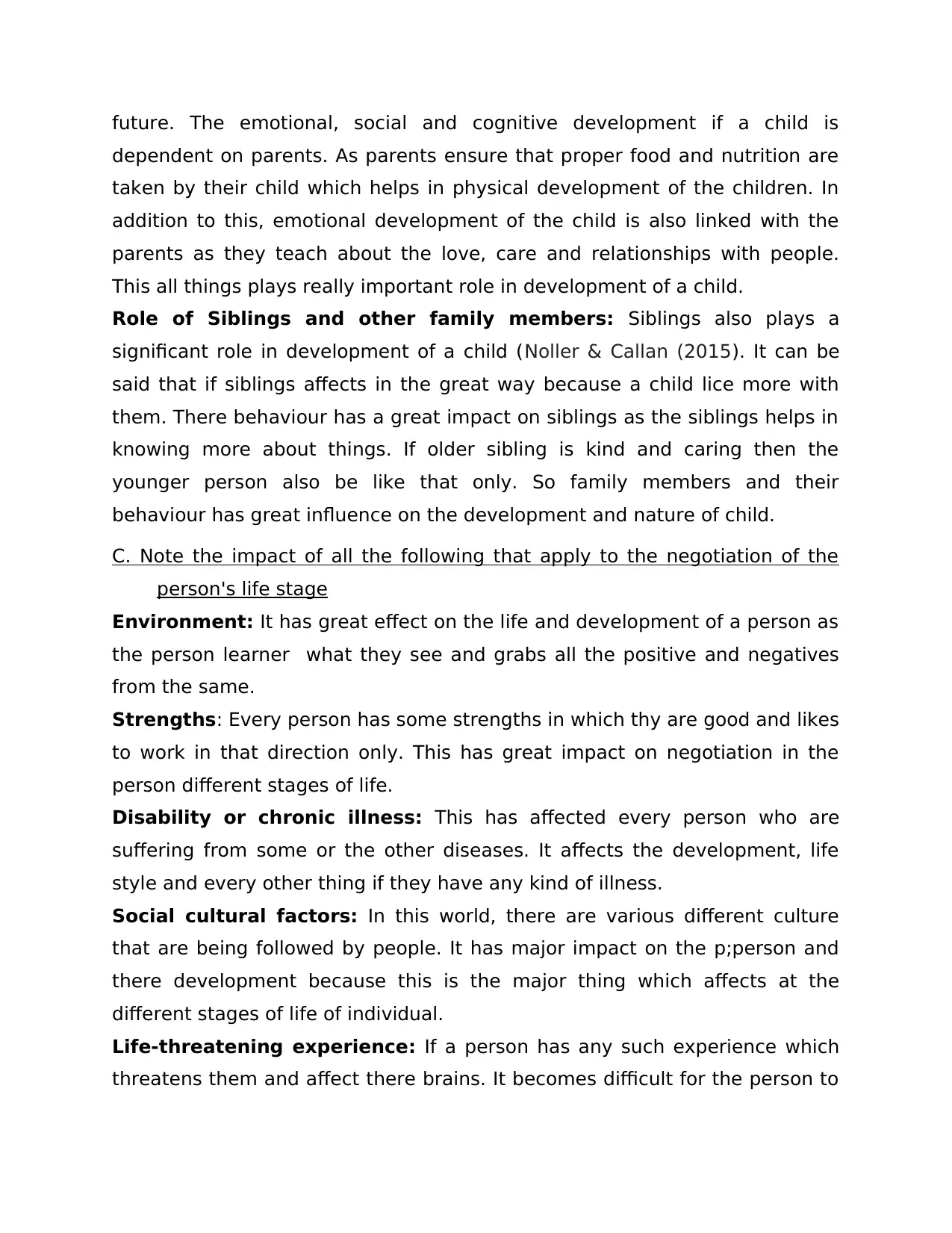
future. The emotional, social and cognitive development if a child is
dependent on parents. As parents ensure that proper food and nutrition are
taken by their child which helps in physical development of the children. In
addition to this, emotional development of the child is also linked with the
parents as they teach about the love, care and relationships with people.
This all things plays really important role in development of a child.
Role of Siblings and other family members: Siblings also plays a
significant role in development of a child (Noller & Callan (2015). It can be
said that if siblings affects in the great way because a child lice more with
them. There behaviour has a great impact on siblings as the siblings helps in
knowing more about things. If older sibling is kind and caring then the
younger person also be like that only. So family members and their
behaviour has great influence on the development and nature of child.
C. Note the impact of all the following that apply to the negotiation of the
person's life stage
Environment: It has great effect on the life and development of a person as
the person learner what they see and grabs all the positive and negatives
from the same.
Strengths: Every person has some strengths in which thy are good and likes
to work in that direction only. This has great impact on negotiation in the
person different stages of life.
Disability or chronic illness: This has affected every person who are
suffering from some or the other diseases. It affects the development, life
style and every other thing if they have any kind of illness.
Social cultural factors: In this world, there are various different culture
that are being followed by people. It has major impact on the p;person and
there development because this is the major thing which affects at the
different stages of life of individual.
Life-threatening experience: If a person has any such experience which
threatens them and affect there brains. It becomes difficult for the person to
dependent on parents. As parents ensure that proper food and nutrition are
taken by their child which helps in physical development of the children. In
addition to this, emotional development of the child is also linked with the
parents as they teach about the love, care and relationships with people.
This all things plays really important role in development of a child.
Role of Siblings and other family members: Siblings also plays a
significant role in development of a child (Noller & Callan (2015). It can be
said that if siblings affects in the great way because a child lice more with
them. There behaviour has a great impact on siblings as the siblings helps in
knowing more about things. If older sibling is kind and caring then the
younger person also be like that only. So family members and their
behaviour has great influence on the development and nature of child.
C. Note the impact of all the following that apply to the negotiation of the
person's life stage
Environment: It has great effect on the life and development of a person as
the person learner what they see and grabs all the positive and negatives
from the same.
Strengths: Every person has some strengths in which thy are good and likes
to work in that direction only. This has great impact on negotiation in the
person different stages of life.
Disability or chronic illness: This has affected every person who are
suffering from some or the other diseases. It affects the development, life
style and every other thing if they have any kind of illness.
Social cultural factors: In this world, there are various different culture
that are being followed by people. It has major impact on the p;person and
there development because this is the major thing which affects at the
different stages of life of individual.
Life-threatening experience: If a person has any such experience which
threatens them and affect there brains. It becomes difficult for the person to
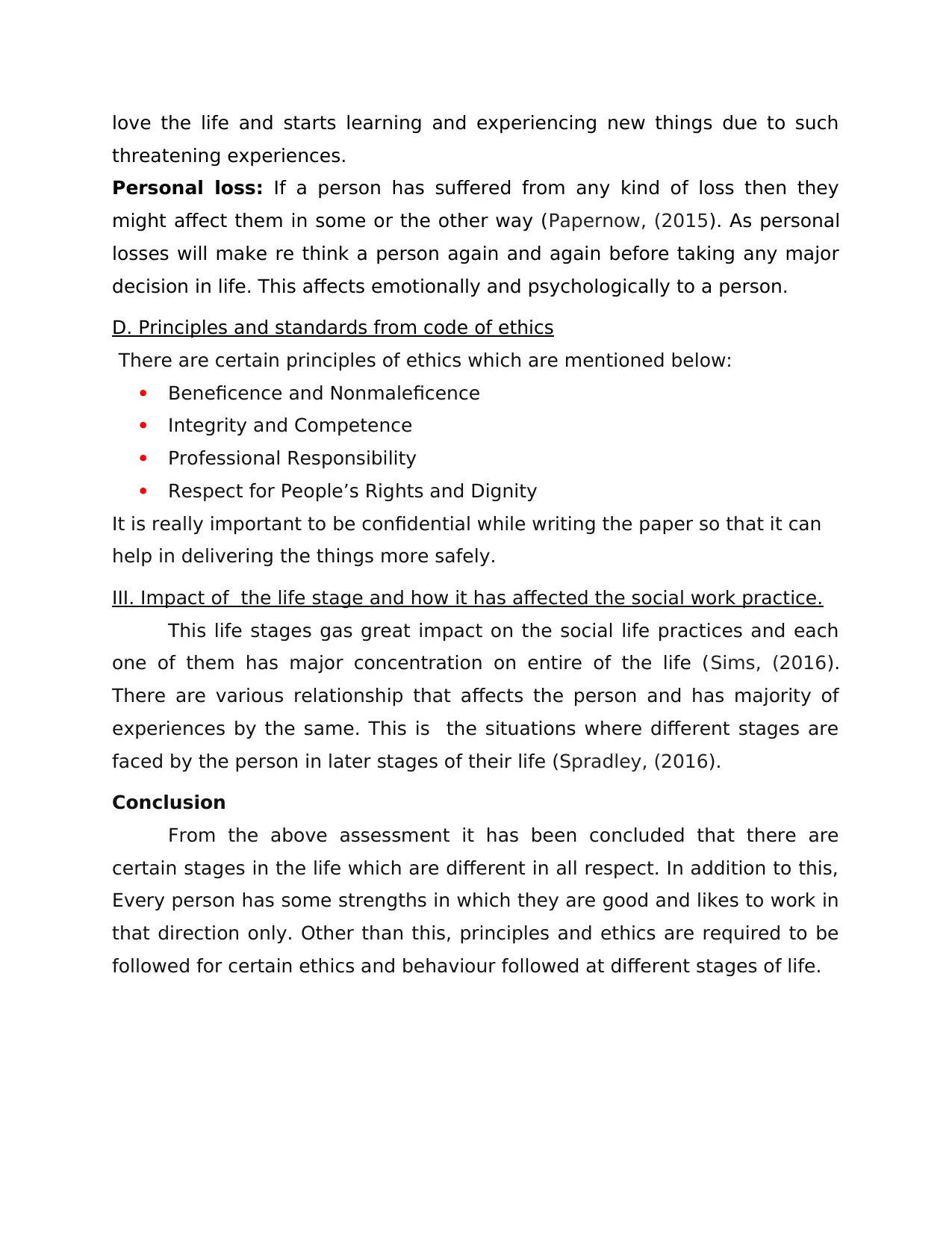
love the life and starts learning and experiencing new things due to such
threatening experiences.
Personal loss: If a person has suffered from any kind of loss then they
might affect them in some or the other way (Papernow, (2015). As personal
losses will make re think a person again and again before taking any major
decision in life. This affects emotionally and psychologically to a person.
D. Principles and standards from code of ethics
There are certain principles of ethics which are mentioned below:
Beneficence and Nonmaleficence
Integrity and Competence
Professional Responsibility
Respect for People’s Rights and Dignity
It is really important to be confidential while writing the paper so that it can
help in delivering the things more safely.
III. Impact of the life stage and how it has affected the social work practice.
This life stages gas great impact on the social life practices and each
one of them has major concentration on entire of the life (Sims, (2016).
There are various relationship that affects the person and has majority of
experiences by the same. This is the situations where different stages are
faced by the person in later stages of their life (Spradley, (2016).
Conclusion
From the above assessment it has been concluded that there are
certain stages in the life which are different in all respect. In addition to this,
Every person has some strengths in which they are good and likes to work in
that direction only. Other than this, principles and ethics are required to be
followed for certain ethics and behaviour followed at different stages of life.
threatening experiences.
Personal loss: If a person has suffered from any kind of loss then they
might affect them in some or the other way (Papernow, (2015). As personal
losses will make re think a person again and again before taking any major
decision in life. This affects emotionally and psychologically to a person.
D. Principles and standards from code of ethics
There are certain principles of ethics which are mentioned below:
Beneficence and Nonmaleficence
Integrity and Competence
Professional Responsibility
Respect for People’s Rights and Dignity
It is really important to be confidential while writing the paper so that it can
help in delivering the things more safely.
III. Impact of the life stage and how it has affected the social work practice.
This life stages gas great impact on the social life practices and each
one of them has major concentration on entire of the life (Sims, (2016).
There are various relationship that affects the person and has majority of
experiences by the same. This is the situations where different stages are
faced by the person in later stages of their life (Spradley, (2016).
Conclusion
From the above assessment it has been concluded that there are
certain stages in the life which are different in all respect. In addition to this,
Every person has some strengths in which they are good and likes to work in
that direction only. Other than this, principles and ethics are required to be
followed for certain ethics and behaviour followed at different stages of life.
⊘ This is a preview!⊘
Do you want full access?
Subscribe today to unlock all pages.

Trusted by 1+ million students worldwide
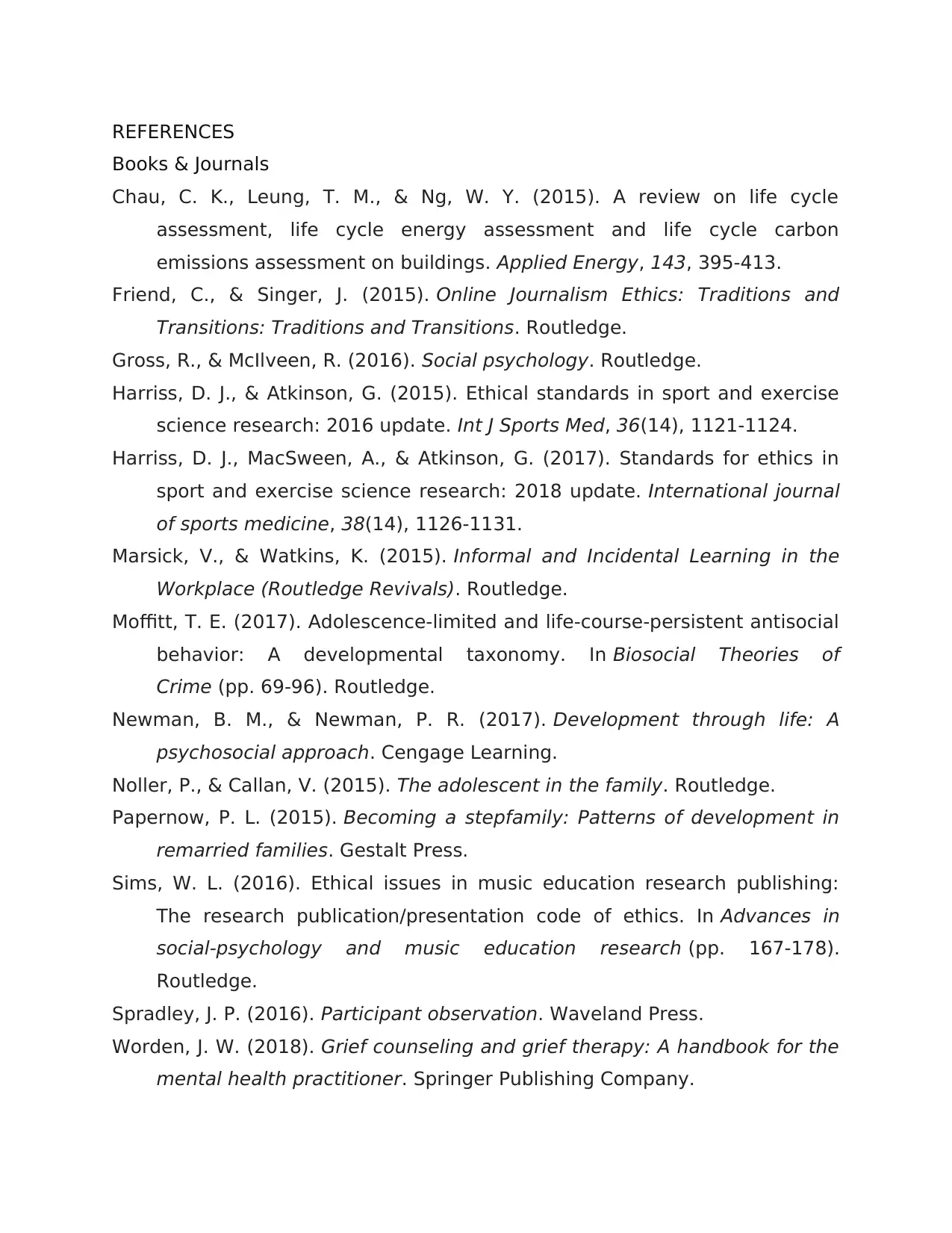
REFERENCES
Books & Journals
Chau, C. K., Leung, T. M., & Ng, W. Y. (2015). A review on life cycle
assessment, life cycle energy assessment and life cycle carbon
emissions assessment on buildings. Applied Energy, 143, 395-413.
Friend, C., & Singer, J. (2015). Online Journalism Ethics: Traditions and
Transitions: Traditions and Transitions. Routledge.
Gross, R., & McIlveen, R. (2016). Social psychology. Routledge.
Harriss, D. J., & Atkinson, G. (2015). Ethical standards in sport and exercise
science research: 2016 update. Int J Sports Med, 36(14), 1121-1124.
Harriss, D. J., MacSween, A., & Atkinson, G. (2017). Standards for ethics in
sport and exercise science research: 2018 update. International journal
of sports medicine, 38(14), 1126-1131.
Marsick, V., & Watkins, K. (2015). Informal and Incidental Learning in the
Workplace (Routledge Revivals). Routledge.
Moffitt, T. E. (2017). Adolescence-limited and life-course-persistent antisocial
behavior: A developmental taxonomy. In Biosocial Theories of
Crime (pp. 69-96). Routledge.
Newman, B. M., & Newman, P. R. (2017). Development through life: A
psychosocial approach. Cengage Learning.
Noller, P., & Callan, V. (2015). The adolescent in the family. Routledge.
Papernow, P. L. (2015). Becoming a stepfamily: Patterns of development in
remarried families. Gestalt Press.
Sims, W. L. (2016). Ethical issues in music education research publishing:
The research publication/presentation code of ethics. In Advances in
social-psychology and music education research (pp. 167-178).
Routledge.
Spradley, J. P. (2016). Participant observation. Waveland Press.
Worden, J. W. (2018). Grief counseling and grief therapy: A handbook for the
mental health practitioner. Springer Publishing Company.
Books & Journals
Chau, C. K., Leung, T. M., & Ng, W. Y. (2015). A review on life cycle
assessment, life cycle energy assessment and life cycle carbon
emissions assessment on buildings. Applied Energy, 143, 395-413.
Friend, C., & Singer, J. (2015). Online Journalism Ethics: Traditions and
Transitions: Traditions and Transitions. Routledge.
Gross, R., & McIlveen, R. (2016). Social psychology. Routledge.
Harriss, D. J., & Atkinson, G. (2015). Ethical standards in sport and exercise
science research: 2016 update. Int J Sports Med, 36(14), 1121-1124.
Harriss, D. J., MacSween, A., & Atkinson, G. (2017). Standards for ethics in
sport and exercise science research: 2018 update. International journal
of sports medicine, 38(14), 1126-1131.
Marsick, V., & Watkins, K. (2015). Informal and Incidental Learning in the
Workplace (Routledge Revivals). Routledge.
Moffitt, T. E. (2017). Adolescence-limited and life-course-persistent antisocial
behavior: A developmental taxonomy. In Biosocial Theories of
Crime (pp. 69-96). Routledge.
Newman, B. M., & Newman, P. R. (2017). Development through life: A
psychosocial approach. Cengage Learning.
Noller, P., & Callan, V. (2015). The adolescent in the family. Routledge.
Papernow, P. L. (2015). Becoming a stepfamily: Patterns of development in
remarried families. Gestalt Press.
Sims, W. L. (2016). Ethical issues in music education research publishing:
The research publication/presentation code of ethics. In Advances in
social-psychology and music education research (pp. 167-178).
Routledge.
Spradley, J. P. (2016). Participant observation. Waveland Press.
Worden, J. W. (2018). Grief counseling and grief therapy: A handbook for the
mental health practitioner. Springer Publishing Company.
Paraphrase This Document
Need a fresh take? Get an instant paraphrase of this document with our AI Paraphraser

1 out of 11
Related Documents
Your All-in-One AI-Powered Toolkit for Academic Success.
+13062052269
info@desklib.com
Available 24*7 on WhatsApp / Email
![[object Object]](/_next/static/media/star-bottom.7253800d.svg)
Unlock your academic potential
Copyright © 2020–2025 A2Z Services. All Rights Reserved. Developed and managed by ZUCOL.





